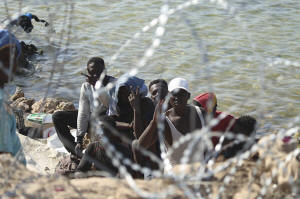Reports of Trump deportation plans highlight abuse of migrants in Libya
[May 09, 2025]
By RENATA BRITO and FATMA KHALED
CAIRO (AP) — Reports of plans to deport migrants from the U.S. to Libya,
a country with a documented history of serious human rights violations
and abuse of migrants, have spotlighted the difficulties they face in
the lawless North African nation.
Migrants in Libya are routinely arbitrarily detained and placed in
squalid detention centers where they are subjected to extortion, abuse,
rape and killings.
A U.N.-backed, independent fact-finding mission found evidence that
crimes against humanity had been committed against migrants in Libya.
Victims were subjected to enslavement, forced disappearance, torture and
murder, among other crimes, the investigators found. Dead migrants have
been found in mass graves across the country, while tens of thousands of
others have drowned trying to escape Libya on smugglers' boats.
“It’s hell on earth for migrants,” said Tarek Megerisi, a senior policy
fellow at the European Council on Foreign Relations.
“All they will have are different forms of abuse — if they are lucky
enough, they will end up on a rickety boat in the Mediterranean,” added
Megerisi, who is Libyan.
A fractured country ruled by militias
Libya plunged into chaos after a 2011 NATO-backed uprising toppled and
killed longtime dictator Moammar Gadhafi. The country split, with rival
administrations in the east and west backed by a web of rogue militias.
“Their main business model is smuggling, and people smuggling is a major
part of that,” Megerisi said.
Both the Tripoli-based government of Prime Minister Abdul Hamid Dbeibah
and its rival administration in eastern Libya controlled by military
commander Khalifa Hifter have denied signing a deportation deal with the
Trump administration.

Some 800,000 migrants seeking work or who have fled war in their home
countries live in Libya, according to the International Organization for
Migration. Each year, thousands attempt the dangerous Mediterranean
crossing from the North African country to Europe.
Despite documented abuses in Libya, the European Union and Italy have
for years funded, trained and equipped Libyan groups, including the
coast guard, to stop migrants from reaching European shores.
Abuse and extortion in migrant detention centers
Migrants intercepted at sea or elsewhere in Libya are subject to
arbitrary detention and extortion in centers run by armed groups that
are either affiliated with state authorities or are autonomous, said
Mehdi Ben Youssef, program lead at Lawyers for Justice in Libya. Those
groups extort migrants for money in exchange for release — only for them
to be captured again by another armed group, detained and tortured.
Ben Youssef said those who could be deported from the U.S. to Libya
“would be highly exposed to cycles of crimes.”
In detention centers, migrants are tortured and kept in “horrific
conditions,” lacking legal representation and proper access to water and
health care, Ben Youssef said. Families outside Libya are blackmailed
with cellphone videos of their relatives being tortured to pay varying
sums for their release — payments that often offer no real guarantee of
freedom.
A 2019 Associated Press investigation found that huge sums of EU funds
meant to improve conditions for migrants ended up in the hands of
militiamen, traffickers and coast guard members who exploited migrants
in this cycle of catch and release.
[to top of second column]
|

Migrants gather in an area near the Libyan-Tunisia border, as Libyan
security forces and Libyan Red Cross workers distribute food aid to
them on Sunday, July 23, 2023. (AP Photo/Yousef Murad, file)

Restrictions hinder groups in Libya from aiding migrants
Last month, Libya's Internal Security Agency ordered 10
international aid organizations to suspend operations and close
offices, accusing the groups of violating local laws by providing
aid to African migrants, touting a “replacement” conspiracy theory
and resulting in more targeting of Black migrants.
Those groups were already operating in a “highly restrictive
environment” amid numerous crackdowns on civil society, Ben Youssef
said.
Black migrants, and especially non-Arabs, face abuse such as forced
labor and extortion more so than migrants of other nationalities, a
humanitarian worker in Libya told The AP.
Attorneys said Wednesday that U.S. authorities informed some
migrants of plans to deport them to Libya. That is troubling because
it sends the message Libya is safe when it’s not, said the worker,
who spoke on condition of anonymity for fear of retribution.
The worker’s team, which travels to reach vulnerable communities,
helps with food distribution and provides psychosocial support, has
been hindered since Libya ordered aid agencies to suspend
operations.
Libya is “not a safe country for migrants," and the order made the
situation worse, said Claudia Lodesani, who heads Doctors Without
Borders' programs for Libya.
Libyan authorities have ordered private medical clinics
collaborating with the group not to respond to migrants’ health
needs.
“Our organization is very concerned about the consequences these
orders will have on the health of migrant people in Libya,” Lodesani
said.
More questions than answers
For now, there are still more questions than answers on whether
deportations to Libya would actually take place. A U.S. judge said
Wednesday that migrants can’t be deported without a chance to
challenge such a move in court.
“What would happen to people once they land in Libya? ... Would they
be detained?” asked Camille Le Coz, who leads the European branch of
the Migration Policy Institute think tank.

She noted that Libya has a very restrictive asylum procedure,
recognizing refugees from only a handful of nationalities.
“This type of operation is expensive, it’s difficult to set up, and
so, we can speculate that it might be to show that if you get to the
U.S. you might be sent to this place that is extremely dangerous for
migrant populations and that this may deter people from coming," Le
Coz said.
___
Brito reported from Barcelona, Spain.
All contents © copyright 2025 Associated Press. All rights reserved |